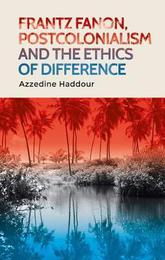
|
Frantz Fanon, Postcolonialism and the Ethics of Difference
Paperback / softback
Main Details
| Title |
Frantz Fanon, Postcolonialism and the Ethics of Difference
|
| Authors and Contributors |
By (author) Azzedine Haddour
|
| Physical Properties |
| Format:Paperback / softback | | Pages:280 | | Dimensions(mm): Height 216,Width 138 |
|
| Category/Genre | Literary theory
Colonialism and imperialism |
|---|
| ISBN/Barcode |
9781526156105
|
| Classifications | Dewey:325.3092 |
|---|
| Audience | |
|---|
|
Publishing Details |
| Publisher |
Manchester University Press
|
| Imprint |
Manchester University Press
|
| Publication Date |
29 June 2021 |
| Publication Country |
United Kingdom
|
Description
This book underscores the ethical dimension of Fanon's work by focusing on the interplay of language, gender and colonial politics, by discussing the implication of the medical and psychiatric establishment in the institution of colonialism and by assessing the importance of existential phenomenology in Fanon's project of decolonisation. -- .
Author Biography
Azzedine Haddour is Senior Lecturer in French at University College London -- .
Reviews'With this refreshing and, on occasion, provocative book, Azzedine Haddour confirms his reputation as one of the most searching and effective readers of Fanon today. Challenging many of the received ideas about his subject, Haddour's aim is to engage more holistically with Fanon's humanism and its ethical preoccupations across his life and writing. The result is a highly original contribution that manages to entertain a plurality of perspective. Essential reading for all those interested in the historical emergence of postcolonial thought and in its contemporary resonances.' Charles Forsdick, James Barrow Professor of French at the University of Liverpool 'We are nothing on earth if we are not, first of all, slaves of a cause, the cause of the people, the cause of justice, the cause of liberty". Recalling these powerful late words of Frantz Fanon, Haddour provocatively resituates Fanon at once historically in terms of his own cultural, social and political environment, whilst also engaging deeply with more recent critics of Fanon who claim him for the politics of difference or the lumpenproletariat. Haddour shows us that while Fanon focuses throughout his work on the always paradoxical and contradictory forms of alienation under which he lived, he was above all an ethical thinker: anti-racist, humanist and internationalist.' Robert JC Young, Julius Silver Professor of English and Comparative Literature at New York University -- .
|